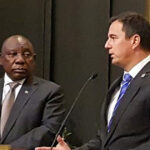The South African political landscape has been thrown into disarray following the defection of Floyd Shivambu, former deputy president of the Economic Freedom Fighters (EFF), to the umkhonto wesizwe Party (MKP).
This move has raised questions about the future of both parties and the broader political landscape.
Shivambu's departure from the EFF, a party he co-founded with Julius Malema in 2013, comes after years of speculation about tensions within the party's leadership. His decision to join the MKP, a party closely aligned with former president Jacob Zuma, has been met with a mixture of surprise and intrigue.
The MKP, which has been making significant strides in recent elections, has welcomed Shivambu and his former EFF colleague, Mzwanele Manyi, with open arms. Vincent Mdunge, spokesperson for the MKP in KwaZulu-Natal, described the two as "political giants" who would be valuable assets to the party.
"Remember people would not come for nothing, they would come for specific reasons. Therefore, we’ve got to look after them, which then means we have to reshuffle and make a movement, either in Parliament or elsewhere in the MKP where they can contribute while they are also benefiting because they earned salaries from where they are coming from," said Mdunge.
Mdunge confirmed that Zuma would personally decide where Shivambu and Manyi would be deployed within the party. The MKP has already taken steps to accommodate the newcomers, firing 18 MPs last week to create space for them. However, the Electoral Commission of South Africa (IEC) has cautioned that the party can only bring in new members if there are vacancies on its candidate list due to death, dismissal, or resignation.
Despite these logistical hurdles, Shivambu and Manyi are likely to remain in Parliament, as the MKP is still in the process of replacing those who were fired. Manyi, who brings with him extensive experience in academia and business, has said he is eager to learn about his new role in the MKP.
"I am still familiarising myself. I still need to have a discussion with ubaba (Zuma), and ubaba would decide where to deploy me," said Manyi.
Shivambu's defection has also sparked speculation about possible future alliances or even a merger between the EFF and the MKP. While the two parties have some ideological differences, analysts believe that Shivambu's move could pave the way for greater cooperation, particularly as both parties navigate the changing political landscape ahead of the 2024 elections.
However, any such coalition would require bridging significant ideological and strategic gaps. The MKP's close ties to Zuma and its stance on issues like relations with China and Russia contrast sharply with the EFF's more pro-Western positions.
The MKP also faces its own challenges, including allegations of internal turmoil and cronyism. The party's success will depend largely on Shivambu's ability to navigate these obstacles and support its strategic direction.
The impact of Shivambu's departure on the EFF is still being debated. Some analysts believe that his resignation could weaken the party, while others contend that the EFF's strong ideological roots and Malema's leadership will allow it to weather this period of uncertainty.
Professor Susan Booysen, a political analyst, believes that Shivambu's alliance with the MKP could benefit broader left-wing movements in South Africa, particularly as the MKP seeks to establish a distinct identity separate from both the ruling ANC and the EFF.
Professor Dirk Kotzé, a political science lecturer at Unisa, expects Shivambu to quickly rise among the MKP's most prominent officials, using his knowledge and contacts to increase the party's visibility, particularly in Parliament.
Shivambu's defection has also sparked speculation about the reasons behind his decision. Some analysts believe that his departure was motivated by internal strife within the EFF, particularly in relation to his relationship with Malema. Others suggest that Shivambu's resignation stemmed from dissatisfaction with his alleged marginalisation within the party.
Professor Andre Duvenhage, a political expert, suggests that Shivambu's move could also be seen as an attempt to find political cover amid ongoing corruption claims related to the VBS Mutual Bank scandal. By aligning himself with the MKP, Shivambu may be positioning himself in a political context that is more favourable or less hostile, depending on the outcome of his legal problems.











